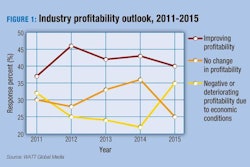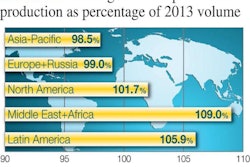The reported record 5 million tons of wheat that Egypt has purchased this season suggests chronic smuggling has been made worse by an inflated government purchasing price, traders and experts say in a Reuters report.
Annually, Egypt fixes a local procurement price for Egyptian wheat that is higher than global prices in an attempt to encourage farmers to grow it instead. This year’s purchasing price is up to $200 per ton above market.
Over the years, the high price has led to smuggling, where foreign wheat – mostly Russian – is sold to the government and labeled as Egyptian.
Traders believe as much as 1 million of the 5 million tons purchased this season could be foreign wheat, and 400,000 tons could be Egyptian wheat stored from the 2014 season. Egypt is the world’s largest wheat importer.
“It’s simple economics. When there is a big price difference between Egyptian wheat and foreign wheat, it will be too tempting for some traders not to sell their imported wheat as local to the government,” an Egyptian wheat expert who has worked closely with the government told Reuters.
Before the harvest season begins, small-scale local traders usually approach farmers and make a deal to buy their wheat at a lower price than that announced by the government and then sell it when the procurement starts, adding in some wheat they already imported to make a profit.
“They convince the farmers that they are taking on some of their transport costs and that the quality of their wheat is lower than what is demanded and take it for a cheaper price, and then they can easily mix it in their bags with foreign wheat,” the expert said.
“There’s definitely some Russian, Ukrainian and maybe some French (wheat),” another trader said.
The supply ministry denies claims of smuggling and says the wheat is being rigorously inspected.
















